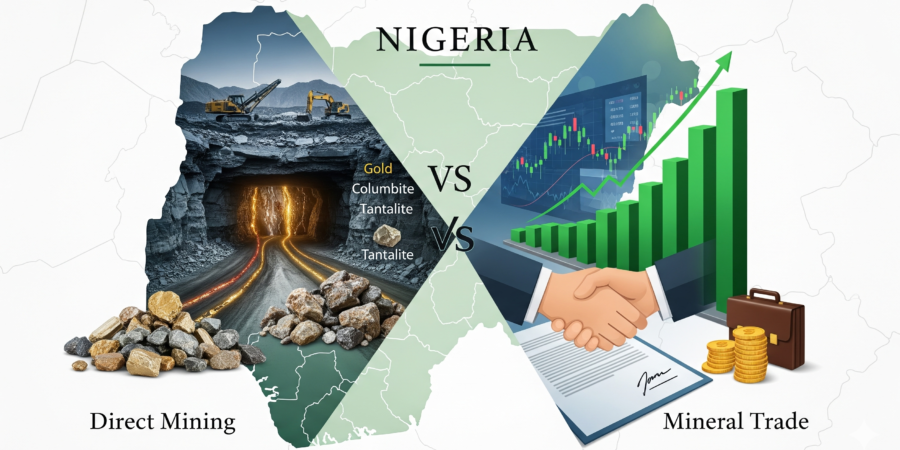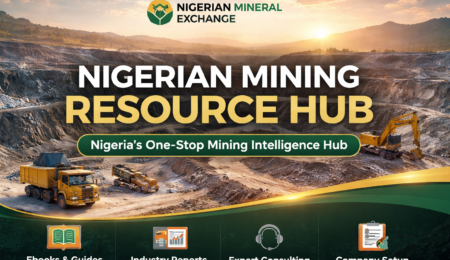When it comes to Nigeria’s mineral sector, investors face two primary entry points: direct mining operations or mineral trading and export. Both offer profitable opportunities, but they carry different risk levels, timelines, and return profiles.
For global investors looking at Nigeria in 2025 and beyond, the key question is: Should I invest in mining projects or focus on mineral trading?
This article compares the two paths and provides practical insights to help investors make informed decisions.
Understanding the Two Paths
1. Mining Investment
Mining involves acquiring or partnering in exploration or production projects. Investors typically fund equipment, labor, licenses, and community engagement in exchange for long-term mineral yields.
Advantages:
- High long-term ROI, especially for gold, lithium, lead, and rare earths.
- Asset ownership-investors secure rights to mineral reserves.
- Potential for vertical integration into processing and exports.
Challenges:
- High upfront capital requirements.
- Regulatory and licensing complexities.
- Risks from community issues or illegal miners.

2. Mineral Trade & Export
Mineral trading focuses on purchasing minerals from licensed miners and selling them to local industries or exporting to international markets.
Advantages:
- Lower capital requirements compared to mining.
- Faster turnover and liquidity.
- Flexible business model-you can focus on one mineral or diversify.
Challenges:
- Margins can fluctuate with global commodity prices.
- Dependence on reliable suppliers.
- Requires export licensing and compliance with Nigerian laws.
ROI Comparison: Mining vs. Mineral Trade
- Mining Projects
- Gold mining ROI: 40–65% annually.
- Lithium projects: 55%+ potential in early-stage ventures.
- Gemstones: 40–65% ROI depending on type, grade, and access to international buyers.
However, ROI is predicated upon lot of factors. It could be more or less. Secondly, it is realized over longer time horizons (2–5 years or more) due to setup, exploration, and community negotiations.
- Mineral Trading & Export
- Gold trading margins: 5–15% per shipment.
- Gemstone trading: 50–70% ROI if sourced at the mine site and exported with proper certification.
- Industrial minerals: 25–40% ROI, with higher volume but lower margins.
Here, returns are realized faster (weeks to months) but require consistent access to supply chains and markets.
Which Path Offers Better Returns?
The answer depends on your risk appetite and investment horizon:
- If you want high, long-term ROI and can handle higher capital investment, mining projects are ideal.
- If you prefer lower entry costs, faster returns, and flexibility, mineral trading and export is the better option.
For many smart investors, the winning strategy is a hybrid model, starting with mineral trading to generate cash flow, then reinvesting profits into mining projects for long-term gains.
Key Considerations for Investors
- Legal Compliance – Both mining and trading require government licenses and permits. Avoid illegal operators at all costs.
- Due Diligence – Verify mining titles, confirm supplier legitimacy, and inspect sites before committing capital.
- Local Partnerships – Success depends on working with local experts who understand Nigeria’s mining ecosystem.
- Market Insight – Track global commodity prices to maximize timing and profitability.
How We Help Investors
At the Nigerian Mineral Exchange, we simplify both mining and trading entry points for investors:
1. The Nigerian Mining Investment Navigator
A premium consultancy service that helps you identify whether mining projects or trading ventures align with your investment goals. Includes sourcing, due diligence, and strategic recommendations.
👉 Book your Strategic Investment Consultation here
2. Mining & Mineral Trading Company Setup (Nigeria)
We assist investors in setting up fully compliant trading or mining companies in Nigeria—covering registration, licensing, and operational structuring.
👉 Learn more about our setup service
3. Ebook: Unlocking Nigeria’s Mineral Wealth – 113 Lucrative Business Ideas
Packed with practical ideas, this ebook helps investors identify high-profit niches across both mining and trading.
📘 The Nigeria Mineral Trading & Licensing Blueprint (2026 Edition)
If you are serious about buying, selling, or trading minerals legally in Nigeria, you cannot afford to rely on guesswork, outdated advice, or hearsay. The regulatory environment is tightening fast, and costly mistakes now lead to permit denials, seizures, or permanent blacklisting.
That’s why we created The Nigeria Mineral Trading & Licensing Blueprint: 2026 Guide to Buying Center Licenses & Purchase Permits — an updated, clear, step-by-step, insider guide that shows you exactly how to obtain Mineral Buying Center Certificates, Purchase & Possession Permits, and related approvals without delays or regulatory traps.
This guide distills real regulatory procedures for 2026, compliance requirements, and practical insights used by serious operators — saving you months of confusion, wasted money, and avoidable risk.
If mineral trading is part of your business future, this blueprint is not optional — it’s protection.
Final Word
Both mining and mineral trading in Nigeria offer significant returns, but they serve different investor profiles. Mining is capital-intensive but highly rewarding in the long run, while mineral trading offers faster and more flexible profits with lower entry barriers.
By combining both strategies, investors can balance short-term cash flow with long-term asset growth, positioning themselves to ride Nigeria’s mineral boom effectively.
With the right partners, due diligence, and compliance, Nigeria’s mineral sector is one of the most profitable investment frontiers in the world today.
READ ALSO:





Leave a Reply